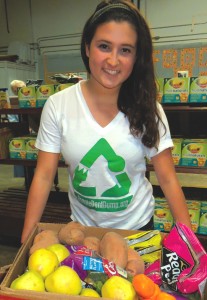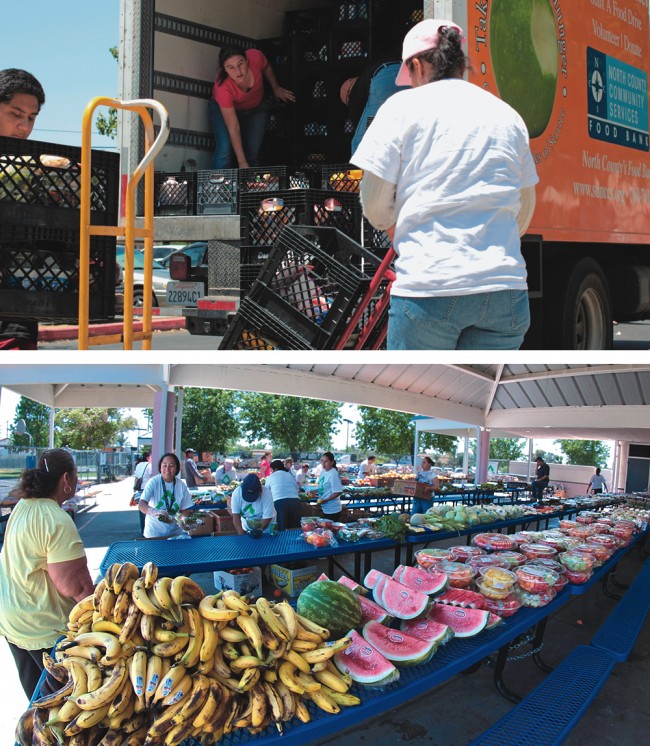“Donate Don’t Dump” in San Diego, California rallies teens to solicit and distribute donations to food-insecure families.
Rich Flammer
BioCycle June 2013, Vol. 54, No. 6, p. 30
When Camille Posard, a high school freshman from Carlsbad, California, began a broadcast journalism class project in 2008 about active duty military families struggling to put food on the table, she had no idea just how profound the impact would be on her and her sister, Gabrielle. What they learned inspired Camille enough to secure a $66,000 grant and create an award-winning documentary on hunger called “One in Seven, the New Face of Hunger,” and Gabrielle to form a nonprofit called “Donate Don’t Dump.” Camille was 16 when she wrote the documentary, and Gabrielle only 12 when she founded the nonprofit.

Gabrielle Posard started Donate Don’t Dump after her sister, Camille Posard, wrote and filmed a documentary titled “One in Seven,” that reported on food insecurity in the U.S., and the amount of edible food being wasted.
Premiering at the Global Peace Film Festival in Orlando, Florida in September 2011, “One in Seven” has been screened more than 80 times throughout the U.S. Camille and the film have won multiple awards, including the 2012 Stephen J. Brady STOP Hunger Scholarship awarded annually by the Sodexo Foundation, a CHSTV (a news program produced by the students of Carlsbad High School) Student Emmy Award, and the California competition at the Yosemite Film Festival.
“The scale of human suffering was staggering in every city we filmed,” Camille recalls. “After learning that 96 billion pounds of edible food goes into U.S. landfills every year, my compassion turned to outrage, and I began recruiting other teens.”
Gabrielle created the “Donate Don’t Dump” logo to spread awareness about both hunger and wasted food. It quickly grew from an icon into a nonprofit. “I started Donate Don’t Dump to change the paradigm of food waste and link concerns about the environment and sustainability to alleviating hunger,” she explains. Donate Don’t Dump now has 20 chapters throughout the U.S. at elementary, high schools and universities. A chapter was also recently formed in Spain.
Student volunteers work to minimize edible food waste generated by restaurants and grocery stores, and host food donation events to collect surplus food that is then provided to food-insecure families. In San Diego County, Donate Don’t Dump goes on food collection runs in the North County Food Bank truck. Other activities include educating, advocating and sponsoring Zero Waste policies. “My mission is to make food rescue as common as recycling,” says Gabrielle, now a sophomore at San Dieguito Academy High School. To date, the national Donate Don’t Dump network of volunteers (4,000 members in 4 states) has been credited with increasing donations to food banks and their partner agencies by over 420 tons and providing 650,000 meals.

Donate Don’t Dump goes on runs in the North County Food Bank truck to collect donated food, which is then distributed at various community locations, including an elementary school.
A member of the Hunger Advocacy Network and The North County Food Policy Council, Gabrielle has already been honored by the White House, California State Senate, U.S. Representative Darrell Issa, and other elected officials. Her passion and message, more profound than her youth, allows her to advocate and lobby in Sacramento for sustainability, the environment, hungry families and Zero Waste.
Albertsons is the first grocer designated by “Donate Don’t Dump” as a “Proud Partner.” The national grocery chain’s “Fresh Rescue” program has donated over 275,000 pounds of good food in 2012 to Feeding America San Diego and other agencies. Among many other programs, including Zero Waste initiatives, Albertsons has a corporate-wide policy to “Donate Don’t Dump” edible food. North County’s Food Bank is also a Proud Partner and integral to Donate Don’t Dump’s work in San Diego County. Another local food bank and member of the Feeding America national network, Feeding America San Diego, will be adopting Gabrielle’s logo and principles as part of its food rescue program this year.
As the Donate Don’t Dump concept continues to grow, the Posard sisters are expanding their advocacy through various mediums. Gabrielle was recently featured in People magazine, has become a contributing teen writer to The Huffington Post, and is actively promoting the USDA and USEPA’s U.S. Food Waste Challenge (see sidebar). Camille, now a freshman at UCLA, has written a new documentary, “Invisible Threat,” set to premiere in the fall of 2013. To learn more, visit www.donatedontdump.org.










